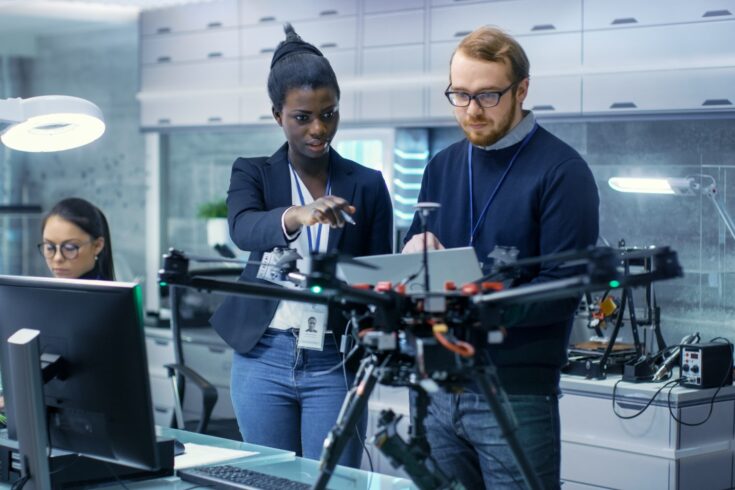A new public dialogue report by the Future Flight Challenge at UK Research and Innovation (UKRI) examines how more integrated aviation systems and technologies might bring about a range of social and economic benefits to the UK.
Commissioned by UKRI and supported by UKRI’s Sciencewise programme, this report provides a unique insight into people’s hopes, expectations and concerns about the potential future operations of three different types of future flight technologies for civilian use: drones, advanced air mobility (‘air taxis’) and regional air mobility (‘eco planes’).
Whilst participants recognised these technologies held potential and promise, their support was conditional on further research before public investment in these technologies is accelerated.
Generally, many felt more strongly about their concerns than the potential benefits, with participants raising concerns about a range of issues including:
- Personal safety and collisions arising from busier and more crowded skies
- Cybersecurity concerns, particularly over automated vehicles being hacked
- Privacy and data protection, to restrict intrusion into and video recording of people’s private and domestic lives
- Governance, regulation and licensing to intentionally constrain “uncontrolled expansion of commercial uses of future flight technologies”
- Accessibility and affordability concerns, given the potential to exacerbate inequality
- Employment, jobs to ensure training is targeted towards those from underprivileged backgrounds or where jobs have been displaced
- Environmental concerns including impacts on wildlife and biodiversity and in particular air, visual and noise pollution to ensure these technologies would be greener than current methods.
Building on participants’ recommendation to expand research in public acceptance and to include a broader range of public and specialist perspectives, the Future Flight Challenge announced it is investing a further GBP1.8 million in social science research through the Economic and Social Research Council (ESRC).
This research will allow further engagement with communities across the UK to better understand how these technologies can be developed in a way that respond to real social needs, concerns or expectations. Drawing on the public’s views will enable better understanding of how the social benefits of these new technologies might be made accessible to all members of UK society.
For example, the Air Mobility Ecosystem Consortium project, funded by the Future Flight Challenge, is working to demonstrate how the UK can use electric air-taxis to improve regional connectivity. Meanwhile, the SATE 2 project in Scotland is working with local authorities and NHS Scotland to improve local aviation networks for patients (and medical supplies) creating the same access to services, regardless of location.
UKRI report findings
However, while greater convenience was rarely seen as justifiable, there were specific exceptions where participants could see the potential for drones, ‘air taxis’ and new aviation technologies to make UK lives better into the future and would therefore potentially be more accepting of their deployment. Justifiable applications included:
- Improving emergency services for medical and humanitarian purposes
- Improving infrastructure or access to goods or services in rural, or remote UK locations
- Improving regional connectivity across the UK
- Improving the environmental credentials and sustainability of public transportation
- Surveying and repair of critical infrastructure, such as storm damage to railways and power lines.
Given considerable uncertainty about how these technologies might evolve, there were overriding concerns about accessibility (in terms of those living with disabilities and in terms of socio-economic accessibility) and appropriate levels of governance. It was clear that public support for these technologies will be contingent on them being accessible to all communities across UK and subject to strong governance and regulation.
Gary Cutts, UKRI Future Flight Challenge Director said: “As a challenge we realise that public perceptions, trust and social desirability are pivotal to the uptake, roll out and ultimately the success of future flight technologies. We know these new technologies have huge potential to benefit people across the UK and change our day-to-day lives, but there are significant hurdles to overcome. This report helps us start to understand the complex public, community and stakeholder attitudes, concerns or expectations that will inform society’s thinking about future flight. The additional funding we’ve contributed will help us better understand how these technologies can be developed in a way that respond to real social needs, concerns or expectations.”
For more information visit:




